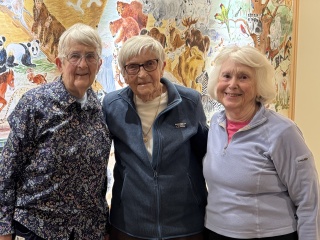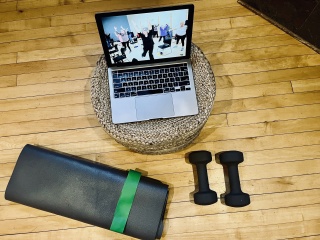ALS (Lou Gehrig's Disease)
ALS Care at UVM Health
Amyotrophic lateral sclerosis, also called ALS or Lou Gehrig’s disease, is a rare neuromuscular disorder that destroys nerve cells in the brain and spinal cord. People with ALS gradually lose control of the muscles that control movement, speaking, eating and breathing.
University of Vermont Health offers the only full-service ALS clinic in Vermont and northern New York. The ALS Association recognizes this clinic as a Certified Treatment Center of Excellence, reflecting our high standards of care.

Why Choose UVM Health?
Our skilled and compassionate team uses their expertise in this complex condition to support you and your family through every step of your care. An important part of our process is talking with you. We want to understand what's important to you and what you hope to achieve with treatment.
As one of the region's leading providers of ALS care, we provide:
- Expertise: Our neuromuscular disorder doctors are triple-board-certified, which means they have completed fellowship training in neurology, neuromuscular medicine and electrodiagnostic medicine. Many hold leadership positions in national organizations dedicated to treating neuromuscular disorders.
- Personalized treatment: Our ALS specialists work with you and your family to understand your goals for care. Together, we develop a treatment plan focused on those goals, as well as wraparound support services.
- Team approach to care: Specialists from numerous fields — your neurologist, palliative care nurse, registered dietitian, mental health counselor and social worker — work together to provide comprehensive, compassionate ALS care. Your team may also include physical, speech and respiratory therapists.
- Academic focus: Our physician-leaders are active researchers, many of whom are training the next generation of experts. You can be confident that you are getting care from clinicians with access to the latest advancements in ALS treatment.
ALS Symptoms
ALS causes the nerve cells that send movement signals from your brain and spinal cord to your muscles to stop working. Without messages telling them to move, your muscles get weak and waste away (atrophy).
While everyone with ALS has different experiences with the disease, early symptoms often include:
- Muscles twitches, cramps and stiffness
- Weakness in the arms, hands, legs, neck or chest
- Difficulty speaking, eating and swallowing
As the disease progresses, you may experience:
- Inability to use your arms and legs
- Difficulty breathing
- Weight loss and malnourishment, as eating is increasingly difficult
Diagnosing Neuromuscular Disorders
Diagnosing ALS can be challenging. There's no single test for it, and symptoms can look similar to those of other neuromuscular diseases.
Your neurologist will complete a thorough physical examination and ask about your symptoms. They will also ask about your medical history and your family's medical history.
Your doctor may request that you undergo specific tests. We offer the latest advanced diagnostic procedures, including:
Your doctor may surgically remove a small piece of a nerve or muscle to be analyzed in a lab.
Certain substances in your blood or urine can help diagnose ALS or rule out other conditions.
An EMG evaluates how well your muscles and nerves work. Your provider inserts a tiny needle conducting an electric current into your muscle. As you contract your muscle, a machine records its electrical activity. At UVM Health, we offer single-fiber EMG, a sensitive specialized test for myasthenia gravis.
A nerve conduction study (nerve conduction velocity) evaluates how electrical signals travel through your nerves. We place two electrode patches on your skin over a specific nerve in different places. One electrode sends a mild electrical impulse, and the other records how your nerve responds.
Some ALS cases are inherited (passed down in families). Genetic testing can help inform your treatment options and determine if your family members are at risk for disease.
Advanced imaging allows us to take photos and videos of the inside of your body. We use the latest imaging technologies, including:
- Magnetic resonance imaging (MRI): Magnets and a specialized computer work together to provide clear, detailed images of your organs.
- Diffusion tensor imaging (DTI): This specialized MRI scan helps identify nerve loss in the corticospinal tract, which conducts messages from the brain to the spinal cord.
A neurological exam assesses how well your brain communicates with your body. Your doctor checks your muscle function, reflexes, speech and senses.
Your doctor inserts a needle or drain in your spinal canal to remove some cerebrospinal fluid for testing.
ALS Disease Treatment
ALS has no cure, but current treatments can improve your symptoms and help you remain strong and independent for as long as possible.
Our experts work with you and your family to create your individualized treatment plan using leading therapies, including:
Gene therapy may help your body produce substances that revive dying nerve cells.
Certain medications can alleviate some ALS symptoms or delay the disease's progression.
Eating often becomes increasingly difficult with ALS. Our registered dietitian can work with you and your family to find nutritious foods that are easy to chew and swallow. If necessary, we can help you with a feeding tube.
Our respiratory therapists can provide ventilation devices or show you exercises to help make breathing easier.
At UVM Health, we know that an ALS diagnosis affects more than just your body. We support you in all aspects of care, including:
- Mental health care: Our caring counselors provide emotional support to you and your family.
- Palliative care: Our palliative care nurses focus on your comfort and well-being.
- Social worker: Our social workers can provide guidance on financial issues, insurance and securing resources for supportive devices.
- Supportive devices: Our care team helps you identify equipment that can make it easier to perform daily activities like bathing, eating, dressing, using the bathroom and walking. Supportive devices include shower handles, raised toilet seats, foot or ankle braces, canes, and walkers.
Rehabilitation therapy can help improve your strength, mobility and ability to perform daily activities. Services include:
- Physical therapy: Strengthening your muscles can help you continue to perform everyday tasks.
- Speech therapy: Our speech and language pathologists help you with communication and swallowing.
Patient Resources
- ALS Association: Their mission is to discover treatments and a cure for ALS, and to serve, advocate for and empower people affected by ALS to live their lives to the fullest.
Awards & Certifications
American Board of Psychiatry & Neurology (ABPN)
UVM Health neuromuscular faculty physicians hold national leadership positions and board certifications in addition to board certification in neurology.
American Board of Electrodiagnostic Medicine (ABEM)
The ABEM has board certified all UVM Health neuromuscular faculty physicians.
Locations Near You
Share your location to see nearby providers and availability
111 Colchester Avenue
Burlington, VT 05401
3113 Roosevelt Highway
Colchester, VT 05446
89 South Williams Street
Burlington, VT 05401-3405
111 Colchester Avenue
Main Campus, East Pavilion, Level 5
Burlington, VT 05401-1473
111 Colchester Avenue
Main Campus, Patrick. Level 5
Burlington, VT 05401-1473
790 College Parkway
Fanny Allen Campus
Colchester, VT 05446
1 South Prospect Street
Arnold, Level 2
Burlington, VT 05401-5505


